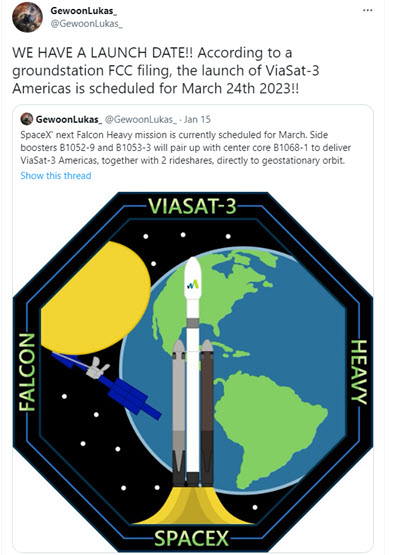We have not made a lot of money in the last..4 years?….in Viasat. Maybe a little vig from buying a LOT at 30 and letting some go at 45 on a position size basis…a few times.
It has been hard to admit a mistake when the “thesis” has literally not gotten off the ground to be proven wrong. Thank you Boeing, Covid, launch capacity shortage, and a little strong-arming from the DOD who cut the line.

The thesis is about to be tested. Assuming the absence of a mostly insured but still VERY annoying event of a massive fireball on a screen in front of our eyes, VSAT3 #1 is going up. And we will test the theory that massive demand for what will be the “cheapest per bit” delivery system will generate IRR in the mid 30’s for…a spend of $800mm-ish spending a lot of time sitting in a warehouse a few miles from our office. And we will find out if Starlink has actually
robbed demand from the satellite – because they certainly haven’t started a price war. To reiterate, sending up lots of satellites as a private company is not a validation of a sustainable business model. Each launch is composed of some “replacement cost” by definition in a LEO network and aside from truly marveling at how that SOB has persevered technically and raised money at superhuman size and valuation, it is not clear that he has proved out anything to date other than you sure as hell better have your own launch capacity if you want to be in the LEO business.
And one nice thing about this delay means VSAT3 #2 will also be in the air within the year, and the ground and support networks are fully loaded, which means the launch to revenue window is shorter than normal. We will then point people to the metaphor of building and leasing an office building – you look really stupid the day before you start leasing. (Pre-covid office building analogy.)
Our risk in not making money over the next four years is that it isn’t just Starlink – it’s a lot of capacity being built all over the globe in every doable orbit and we will/do have an idiot show of capacity growth that will mangle even the best tech and best economics, a statement which defines a commodity business. We can also throw in the likely(Approvals shortly?) acquisition of Inmarsat, which either doubles down on the original sin, or was a master stroke of consolidation that enables a marriage of capacity growth AND the ability to sell it globally, a concept that seems to be finally rearing its head in the industry.
We remain protected in valuation as the defense business is simply a juggernaut of specialty growth – witness the 15x multiple of the worst part of it. And we would suggest that there are simply very few space engineering “clusters” that can mesh together things like hardware design, network management, and security that are directly focused on space. Commercial and military. Off-spreadsheet value.
The company is presently mum on the actual date, but there is nothing more special than grown men with advanced degrees ignoring their families and tweeting all day on space arcana. And note to self: important dates ALWAYS occur the week AFTER options expiration in a personal account.
